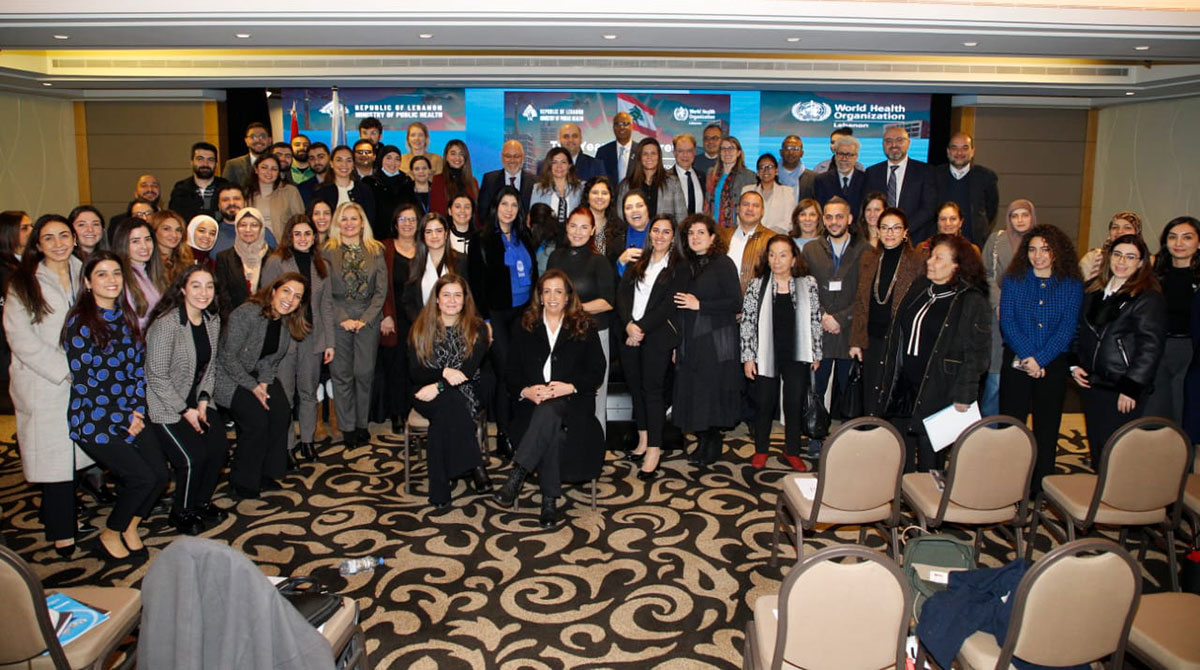 On 14 February 2025, the Ministry of Public Health, in collaboration with the World Health Organization (WHO) Lebanon Office, hosted an event to review the progress of Lebanon's National Health Strategy: Vision 2030.
On 14 February 2025, the Ministry of Public Health, in collaboration with the World Health Organization (WHO) Lebanon Office, hosted an event to review the progress of Lebanon's National Health Strategy: Vision 2030.
Launched in January 2023, the Strategy provides a comprehensive blueprint for the reform of Lebanon's health system. It aims to improve access to health care, strengthen public health functions and build resilience within the sector.
The 2-year review provided an in-depth assessment of progress on the Strategy’s objectives and identified areas in which further efforts are needed.
WHO played a central role in organizing and hosting the event which brought together key stakeholders, including UN agencies, international donors, health sector partners and ministry staff.
Panel discussions explored vital topics such as emergency response lessons, strengthening public health functions, advancing universal health coverage, digital health, workforce development and the role of donors and partners in supporting Vision 2030.
Panel Discussions
Lessons from crisis: key insights from Lebanon’s recent emergency response
Panelists shared lessons from Lebanon's recent emergency responses, discussing improvements in governance, coordination and next steps in emergency preparedness to ensure a more resilient health system.
Strengthening essential public health functions: where do we stand today?
The panel evaluated the state of Lebanon's essential public health functions and examined the steps needed to strengthen the health system, including better data collection and decision-making.
Universal health coverage: advancing access and equity
Discussions focused on expanding health care access for all Lebanese citizens, addressing the progress Lebanon has made towards achieving universal health coverage and identifying further steps to improve equity.
Digital health and workforce development: transforming the health sector
The role of digital health tools and capacity-building in strengthening Lebanon’s health system was a key focus as the panel highlighted the need for technological innovation and workforce development to support systemic reform.
Donors’ and partners’ contributions to Vision 2030
The session explored how international aid supports Lebanon’s health sector and helps ensure long-term improvements in efficiency and resilience.
Major achievements
The event featured 12 roll-up banners celebrating progress made in 2024 towards strengthening Lebanon's health system. Highlights included: enhanced emergency response mechanisms and preparedness through the Public Health Emergency Operations Centre (PHEOC); expanded access to hospitalization and medication, especially for vulnerable populations, and capacity-building in public hospitals, including mass casualty and mental health training.
Improvements in medical supply chain management and tracking systems via the Logistics Management System (LMS) and Meditrack were highlighted, as were strengthened national health data systems, better monitoring and reporting through the Civil Registration and Vital Statistics (CRVS) and Mortality System, and the development of a comprehensive mental health strategy. The banners also featured improvements in public health surveillance and laboratory support, expanded people-centered primary care, increased access to influenza vaccines for health care workers and first aid supplies for vulnerable populations in shelters.
Moving forward: leadership and continuity
Outgoing Minister Dr Firass Abiad reflected on Lebanon's remarkable achievements over the past 2 years. While acknowledging the challenges the country has faced, he highlighted how the Ministry's transformative approach had turned crises into opportunities, building resilience and laying the foundation for long-term improvements. Dr Abiad expressed his gratitude to all Ministry partners and stakeholders for their unwavering support.
Lebanon’s newly appointed Public Health Minister Dr Rakan Nassereldine stressed the importance of continuity in advancing Lebanon’s health strategy. He assured stakeholders that key priorities, such as evidence-based medicine and continued collaboration with partners, would guide his leadership and reaffirmed his Ministry’s commitment to building on the collective efforts of the previous government.
WHO Representative in Lebanon Dr Abdinasir Abubakar commended the Ministry and its partners for transforming challenges into opportunities for reform. He expressed his gratitude to the Ministry of Public Health for its dedication and leadership and reaffirmed WHO’s steadfast support for Lebanon’s Vision 2030 and commitment to helping Lebanon build a health system that is inclusive, resilient and prepared for the future, ensuring Health for All.
National Health Strategy Day served as a celebration of Lebanon's progress and a reminder of the work that remains. With continued collaboration among all stakeholders, Lebanon is poised to further advance its health sector and achieve the goals set out in Vision 2030, ensuring better health outcomes for all its citizens.


